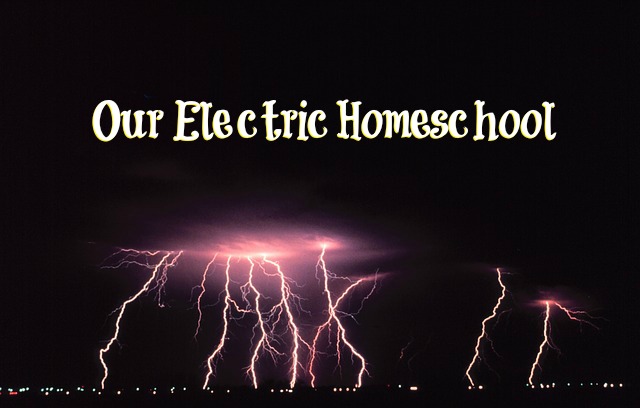 Not long ago my son asked me why I called my blog Electric Homeschooling. Electric homeschool sounds like a good name! He didn’t know the word eclectic so I explained what eclectic meant and what makes our homeschool an eclectic homeschool. My son ended up coining a new phrase for us. We are now dubbed the electric homeschool when we lapse into a bit of silliness.
Not long ago my son asked me why I called my blog Electric Homeschooling. Electric homeschool sounds like a good name! He didn’t know the word eclectic so I explained what eclectic meant and what makes our homeschool an eclectic homeschool. My son ended up coining a new phrase for us. We are now dubbed the electric homeschool when we lapse into a bit of silliness.
When I first started homeschooling I wasn’t certain what kind of method suited us. I knew classical would not be good for us. Charlotte Mason sounded okay, but not really my style either. Unschooling? Well, I have done some of that, but I knew it wouldn’t be a good fit long-term. A unit study approach appealed to me, but doing a theme-focused study across most subjects wasn’t a good fit either. School at home wasn’t my cup of tea either.
Eclectic homeschooling involves meshing many different philosophies into something that works for your family. Now that we are starting our 7th year of homeschooling my perspectives have varied slightly as they should as children mature. I still find myself hopelessly and electrically eclectic. I don’t think I could fit neatly into any box. It just isn’t in my nature.
That said, I wanted to go over a few of the philosophies and explain how I use or don’t use some of the approaches to come up with our own eclectic set-up.
Classical: Classical education can be summarized by Susan Wise Bauer, the popular writer of The Well-Trained Mind:
Classical education depends on a three-part process of training the mind. The early years of school are spent in absorbing facts, systematically laying the foundations for advanced study. In the middle grades, students learn to think through arguments. In the high school years, they learn to express themselves.
In the early years it involves lots of memorization of facts. Logic is an important part of learning how to think. It is also very strong in helping develop critical thinking and language arts skills. It isn’t as strong in math and science.
What works for us:
- Classic literature. I love classic literature and have used it from the start. I have avoided twaddle books to help my children learn to hear, understand, and appreciate classic literature.
- Classical writing. I never thought I would use a classical writing program, but I started used Writing with Skill last year and was pleased with the process and could see how it could be very effective for my kids. I switched to Classical Writing this year and I am very impressed. I plan to continue with Classical Writing through high school.
- Logic studies. We plan on moving from informal logic to completing formal logic studies before high school.
What doesn’t work for us:
- While we really enjoy history, we tend to put the amount of time typically spent on history in classical education into science studies. We spend about twice as much time on science than history.
- My kids never really fit neatly into the stages and memorization isn’t something I have really done very much with my kids. Memorization was difficult for me back in school and I found I needed to learn by understanding why rather than learning a list of information. I’ve taken that same approach with my kids. We don’t memorize much outside of our foreign language studies.
- Since my kids were little I have always asked lots of questions helping them learn to think through things – even things that were far beyond their years. This style doesn’t seem to fit in with the classical model.
- Outlining and notebooking. In my 8th grade year my teacher required me to outline the history textbook. It took me forever each night and I didn’t learn a thing. Classical education often uses note taking and outlining of textbooks for history or science. That did not appeal to me.
Charlotte Mason: The Charlotte Mason approach uses living books, short lessons, and narration. Quality books are used and twaddle is avoided. A wide variety of subjects are approached in a way to help promote a love of learning.
What works for us:
- Living books. Living books have been wonderful ways for us to learn about science, geography, and history.
- Studying a wide variety of subjects. We have always done this although we don’t spend a great deal of time on fine arts.
- Love of learning. This has always been extremely important to me as a parent and teacher. I love learning and seek to engage my kids in the learning process.
- Avoiding twaddle. High quality literature is important to us.
What doesn’t work for us:
- Short lessons My kids have done better when we can have longer periods to stew on a topic.
- Narrations. I must admit I’ve found narrations somewhat busywork for us. When we used living books there was usually a discussion to go along with it so I knew if my kids understood the topic. However, I have used narration to help improve listening comprehension and reading comprehension.
Unschooling: Unschooling is learning through life, play, and self-initiated interests. There are many variants of unschooling and you will probably hear many different definitions if you look into it, but basically it is unstructured child-led learning.
What works for us:
- Unschooling during the early years. I strongly believe play is the best way for a young child to learn. As a result I have done little pre-Kindergarten work with my kids. I’ve never done letter of the day or week or anything like that. We approached learning about letters and their sounds through child-initiated play. I’ve usually started some formal work when the child has started reading on his/her own, but not required any formal work until after the 5th birthday. I also avoided direct questions like “What letter is this?” and instead I might talk about my favorite letter or wonder aloud where the magnetic letter E is on the fridge when my child was playing with letters.
- Incorporating a lifestyle of learning into our day to day life. I often bring home extra books from the library for my kids to peruse when interested. I ask my kids why and how questions all the time to help them think. I also voice aloud some things that I wonder about and ask my kids what they think. In short, I don’t view the end of our school day as an end to learning.
- An hour of time built-in to our school day where my kids explore self-initiated topics of interest. I don’t require any output from them to verify learning, but just let them explore.
What doesn’t work for us:
- Full-time unschooling. I attempted unschooling full-time with my oldest child for the second half of Kindergarten. But it didn’t satisfy him. He needed more guidance. This kid enjoys learning, but wasn’t able to fill his plate.
- Lopsided studies. If I unschooled another child, I’m sure the result would be a very lopsided education since he has very strong interests in one area. He wouldn’t spend much time in his weaker areas.
Unit studies: Unit studies are a theme-based approach to learning. It can cover most, if not all, of the subject areas in one unit study. If you are learning about trains your math, science, history, reading, spelling, and writing would all be related to trains. I think most people who use this approach do a separate math program though. This is great for larger families because it is easily adaptable for multiple ages.
What works for us:
- Unit studies are fun. It is one of our favorite parts of homeschooling. We have learned so much with our history, geography, and science unit studies.
- Exploring the rabbit trails that always come up during our studies.
- The discussions together.
What doesn’t work for us:
- Theme based studies that incorporate several subjects. I prefer to dig deeply in each subject and view the unit study as a broader or deeper way to study one subject.
- Some subjects really require more intense study than you would get in a unit study.
School at home: The school at home approach utilizes textbooks and a school-like approach to learning. In short, it is similar to what school was like when you went to school.
What works for us:
- Textbooks for foreign language. We make more progress when we stick to a formal textbook approach than if we use more informal studies.
- Textbooks for science and math. When my son reached a certain point in science I moved to textbooks because of my limited knowledge base. I’ve always used math textbooks and have found it to work well for my kids. I have tended to use a less traditional math education though by choosing Asian math followed by a challenging math program that expects you to get only half of the harder problems right to be at the level of an A.
What doesn’t work for us:
- Tests. I rarely give tests. I’ve started giving a few for foreign language now. I just don’t see the point for the most part since I teach to mastery. Once I know that my kid knows something we move on. My kid do enjoy having their tests graded and getting a letter grade though.
- Busywork. I avoid busywork. If my kid knows something we skip it.
- Studying. I know I really need to cover this in the future, but when I do give tests I prefer to give them to my kids without giving them a chance to study or cram. It lets me know what is stuck in their long-term memory rather than something that is short-lived in their short-term memory.
- Formal studies all day. I like to use a mix of resources including videos, discussions, living books, games, as well as books.
So there you have it. I am an eclectic homeschooler. There are many great approaches out there, but we don’t fit into one box neatly. We take bits and pieces of the different approaches to find something that works for our family. I have no doubt that this electric homeschool will always be eclectic.

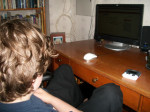
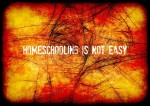

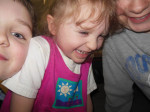
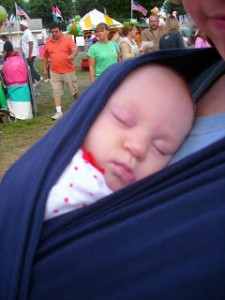
I Found your blog a few weeks ago and have enjoyed it so much I visit it almost every day. There seems something new to learn with each visit. I have not begun homeschooling as of yet, but am eager to get started and you have given me such a foundation to grow on. I appreciate it. Thank you.
Hello I am enjoying reading. My children are through a public charter school from home but I would like to do eclectic homeschooling. My question to you is how do you go about switching and then how does the school district verify that your children are still being educated. I have twins in 3rd grade and my son just graduated from the Charter school from home. It is time for my twins to receive what they need in a different way. Really need to know how to do it and not run into any issues. Thank you in advance for your advice.
Regulations are different depending on where you life. I’d start here to see what the laws are for your state (assuming you live in the USA, that is). https://www.hslda.org/laws/
I too fall under the eclectic style. You said you don’t do many tests, and neither did I for a long time. Are your children still young? I have found its hard to assign them a proper grade for their transcripts if there are not tests. Any thoughts?
My oldest in in 8th and I’m giving him a few tests now. I’m playing around with a way to assess progress through discussion though.
I find that I’m an eclectic homeschooler too, for many of the reasons you mention above. I like some aspects of some methods, and dislike other parts of it. We’re still trying to figure out what works, since I’m new to this. I love the living books and classical literature, but I do use a Singapore Math textbook for math. We do a few tests, but not for a grade, just to check knowledge, and I often do them verbally. Have been mixing copywork/dictation for language arts, mixed with a week of spelling words every now and then. Haven’t tried narration yet, but I think it could be an effective method. I have not yet tried unit studies, but would really like to, because it sounds great to me, but as we study geography, I do incorporate other stuff like cooking, animals, music, books set in those areas, so I guess it’s like a unit study? Haven’t added art, but that’s just something I’m not into, but I wish I had the motivation to do that. Anyway, we’re just trying alot of everything out. The kids do seem to like memorizing where countries are, but otherwise, i’m not big on memorizing facts. I’d rather go into deeper explanations and help them connect and make sense of it.
Thanks for sharing this. I found it very helpful. Being in the early years, it seems we mostly unschool, but I love a little bit of every style of homeschooling. We are big on science too, and after trying out Story o the World, I am not sure what to do with history. We didnt like SOTW.